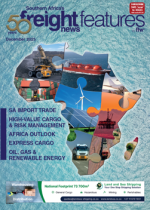The growing adoption of digital platforms and the forging of new trade agreements have created a shift in the global economic landscape.According to Nalini Maharaj, a partner in the shipping and logistics division at Shepstone & Wylie, it is a welcome development which is also evident in South Africa's readiness to embrace advanced import methods in unison with other countries to enable smoother trade facilitation."The industry is undergoing a phase of rapid transformation, and as is the case with all things new, there will be challenges," said Maharaj, indicating that most of these should be considered opportunities and not setbacks. "Now is the right time to have meaningful discussions with important stakeholders. It's crucial to grasp your industry's needs and stay updated on the latest trends."Speaking to Freight News, she said imports had been and always would be one of the most substantial contributors to the South African economy. "This is evident from local issues, like the manufacturing sector's struggles due to high power and operating expenses. Despite these difficulties and other obstacles, there's been a consistent f low of imports, leading to congestion at entry ports. Given this, one can be hopeful that the sector will overcome these challenges and continue to grow."She said South Africa relied heavily on imports to generate revenue and sustain businesses and employment. "We've seen the industry grapple with balancing the scales between increased compliance, higher supplier charges and elevated schedules issued by the South African Revenue Service (Sars), which in some instances were never raised previously. As challenging as it seems, the industry continues to forge ahead. Notably, there is a unified approach between different importers in the same industries."Asked about particular challenges, Maharaj said the global economic crisis had inevitably targeted the import sector in particular. "As the pressure to collect revenue intensifies, imports are viewed as one of the most revenue-yielding components of the South African economy. Government authorities, such as Sars, must enforce stricter compliance mechanisms for imports to yield revenue. In recent months, we've noted almost every facet of imports being challenged by Sars, including tariff interpretation and valuation disputes, with increased detentions and seizures and excessive schedules being raised. While it is an extremely challenging time for the import sector, this is an equally important learning curve for implementing enhanced compliance measures."Maharaj said disputes could arise in any shape or form, and having experienced attorneys at hand was critical for a successful resolution. "Logistics has been one of the most challenging areas to date, but at any level of the supply chain, logistics is a pivotal element. Despite the domestic and global challenges, the need for logistics is unquestionable."To address some of the changes being implemented and increase industry knowledge, Sars has been holding workshops and circulating up-to-date key developments and guidelines on compliance.

